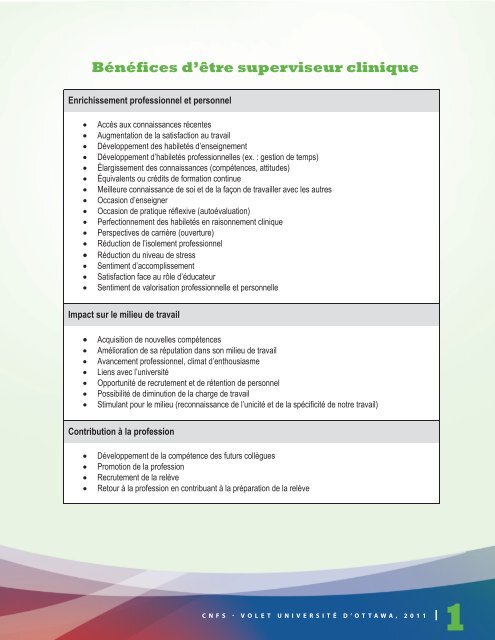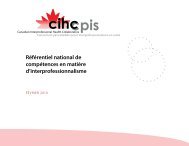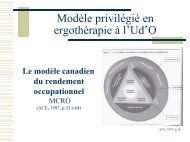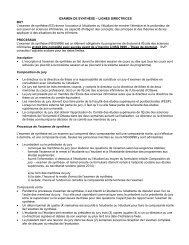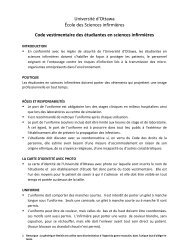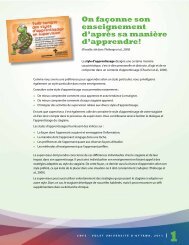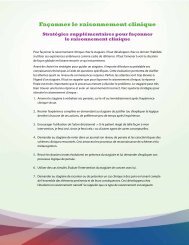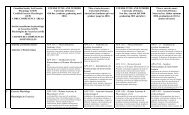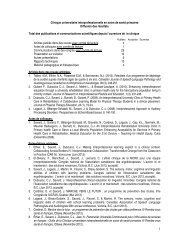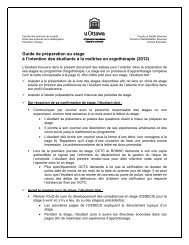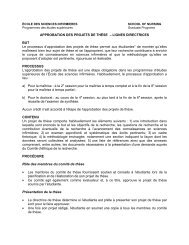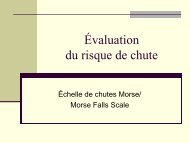Bénéfices d'être superviseur clinique - Faculté des sciences de la ...
Bénéfices d'être superviseur clinique - Faculté des sciences de la ...
Bénéfices d'être superviseur clinique - Faculté des sciences de la ...
Create successful ePaper yourself
Turn your PDF publications into a flip-book with our unique Google optimized e-Paper software.
Bénéfices d’être <strong>superviseur</strong> <strong>clinique</strong><br />
Bénéfices d’être <strong>superviseur</strong> <strong>clinique</strong><br />
Enrichissement Montréal. ISBN: professionnel 2894721390. et personnel<br />
<br />
<br />
<br />
<br />
<br />
<br />
<br />
<br />
<br />
<br />
<br />
<br />
<br />
<br />
<br />
<br />
Accès aux connaissances récentes<br />
Augmentation <strong>de</strong> <strong>la</strong> satisfaction au travail<br />
Développement <strong><strong>de</strong>s</strong> habiletés d’enseignement<br />
Développement d’habiletés professionnelles (ex. : gestion <strong>de</strong> temps)<br />
É<strong>la</strong>rgissement <strong><strong>de</strong>s</strong> connaissances (compétences, attitu<strong><strong>de</strong>s</strong>)<br />
Équivalents ou crédits <strong>de</strong> formation continue<br />
Meilleure connaissance <strong>de</strong> soi et <strong>de</strong> <strong>la</strong> façon <strong>de</strong> travailler avec les autres<br />
Occasion d’enseigner<br />
Occasion <strong>de</strong> pratique réflexive (autoévaluation)<br />
Perfectionnement <strong><strong>de</strong>s</strong> habiletés en raisonnement <strong>clinique</strong><br />
Perspectives <strong>de</strong> carrière (ouverture)<br />
Réduction <strong>de</strong> l’isolement professionnel<br />
Réduction du niveau <strong>de</strong> stress<br />
Sentiment d’accomplissement<br />
Satisfaction face au rôle d’éducateur<br />
Sentiment <strong>de</strong> valorisation professionnelle et personnelle<br />
Impact sur le milieu <strong>de</strong> travail<br />
<br />
<br />
<br />
<br />
<br />
<br />
<br />
Acquisition <strong>de</strong> nouvelles compétences<br />
Amélioration <strong>de</strong> sa réputation dans son milieu <strong>de</strong> travail<br />
Avancement professionnel, climat d’enthousiasme<br />
Liens avec l’université<br />
Opportunité <strong>de</strong> recrutement et <strong>de</strong> rétention <strong>de</strong> personnel<br />
Possibilité <strong>de</strong> diminution <strong>de</strong> <strong>la</strong> charge <strong>de</strong> travail<br />
Stimu<strong>la</strong>nt pour le milieu (reconnaissance <strong>de</strong> l’unicité et <strong>de</strong> <strong>la</strong> spécificité <strong>de</strong> notre travail)<br />
Contribution à <strong>la</strong> profession<br />
<br />
<br />
<br />
<br />
Développement <strong>de</strong> <strong>la</strong> compétence <strong><strong>de</strong>s</strong> futurs collègues<br />
Promotion <strong>de</strong> <strong>la</strong> profession<br />
Recrutement <strong>de</strong> <strong>la</strong> relève<br />
Retour à <strong>la</strong> profession en contribuant à <strong>la</strong> préparation <strong>de</strong> <strong>la</strong> relève<br />
C N F S - V o l e t U n i v e r s i t é d ’ O t t a w a , 2 0 1 1 |1<br />
© 2011, Consortium national <strong>de</strong> formation en santé (CNFS) - Volet Université d’Ottawa. Tous droits réservés.
Références<br />
Baird-Crooks, K., Graham, B., & Bushy, A. (1998). « Implementing a rural nursing course. », Nurse<br />
Educator, 23(6), 33-37.<br />
Boutin, G., & Camaraire, L. (2001). Accueillir et encadrer un stagiaire… Gui<strong>de</strong> pratique à l’usage <strong>de</strong><br />
l’enseignant formateur. Montréal : Éditions Nouvelles.<br />
Brady, J. (2004). Rehabilitation Sciences Clinical Education Joint Working Group Project Report.<br />
Toronto: Ontario Council of Ontario Universities, Office of Health Sciences.<br />
National Council for the Professional Development of Nursing and Midwifery (2008). Clinical<br />
Supervision. A Structured Approach to Best Practice, Discussion Paper 1. Dublin, Ire<strong>la</strong>nd.<br />
Driscoll. J. (2007). Practising Clinical Supervision, A Reflective Approach for Healthcare Professionals<br />
(2 e éd.). Edinburg, New York : Ballière Tindall, Elsevier.<br />
Fried<strong>la</strong>nd, J., Po<strong>la</strong>tajko, H., & Gage, M. (2001). « Expanding the boundaries of occupational therapy<br />
practice through stu<strong>de</strong>nt fieldwork experiences: Description of a provincially-fun<strong>de</strong>d community<br />
<strong>de</strong>velopment project. ». Canadian Journal of Occupational Therapy, 68(5), 301-309.<br />
Lockwood-Rayermann, S. (2003). « Preceptor Lea<strong>de</strong>rship Style and the Nursing Practicum », Journal<br />
of Professional Nursing, 19(1), 32-37.<br />
Londo, R. A., G<strong>la</strong>sser, M. L., & Stearns, J. A. (1999). « Perspectives on longer community-based<br />
preceptorships. », Family Me<strong>de</strong>cine, 31(1), 13-14.<br />
NSW Institute of Rural Clinical Services & Teaching. (2008). A Report: Clinical Supervision for Allied<br />
Health Professionals in Rural NSW.<br />
Neale, A. (2003). « 10 reasons for you to make stu<strong>de</strong>nts an offer they can’t refuse. », OT NOW, mars/<br />
avril, 8-9.<br />
Wagner, S. J. (2004). « Aventures en formation <strong>clinique</strong>. », Communiqué, 18(2), 6-7.<br />
© 2011, Consortium national <strong>de</strong> formation en santé (CNFS) - Volet Université d’Ottawa. Tous droits réservés.<br />
C N F S - V o l e t U n i v e r s i t é d ’ O t t a w a , 2 0 1 1 |2


